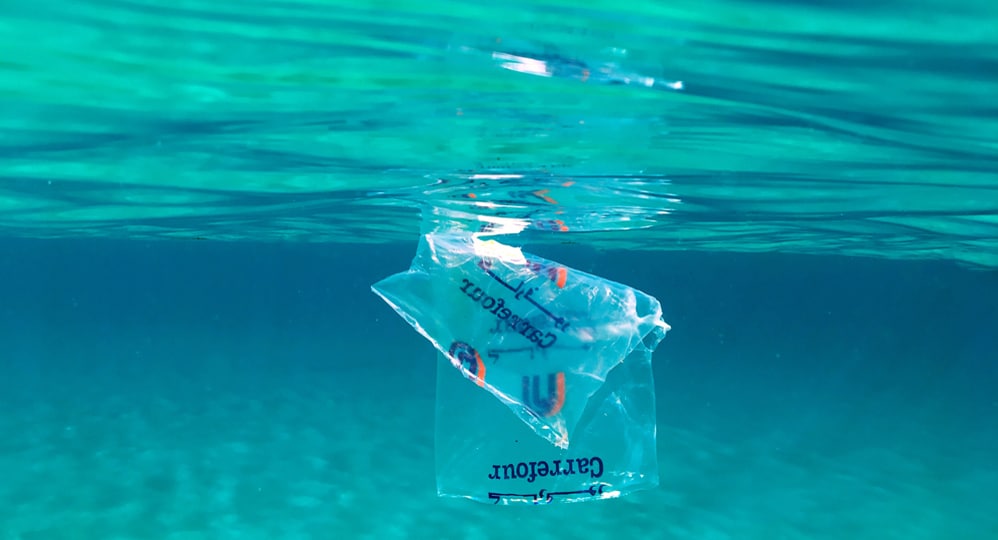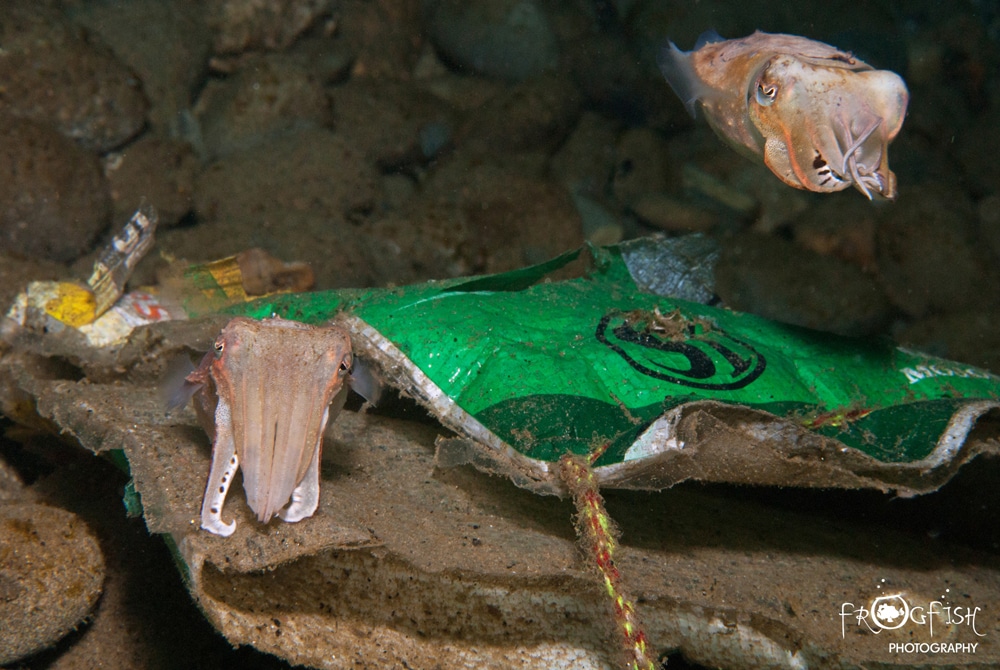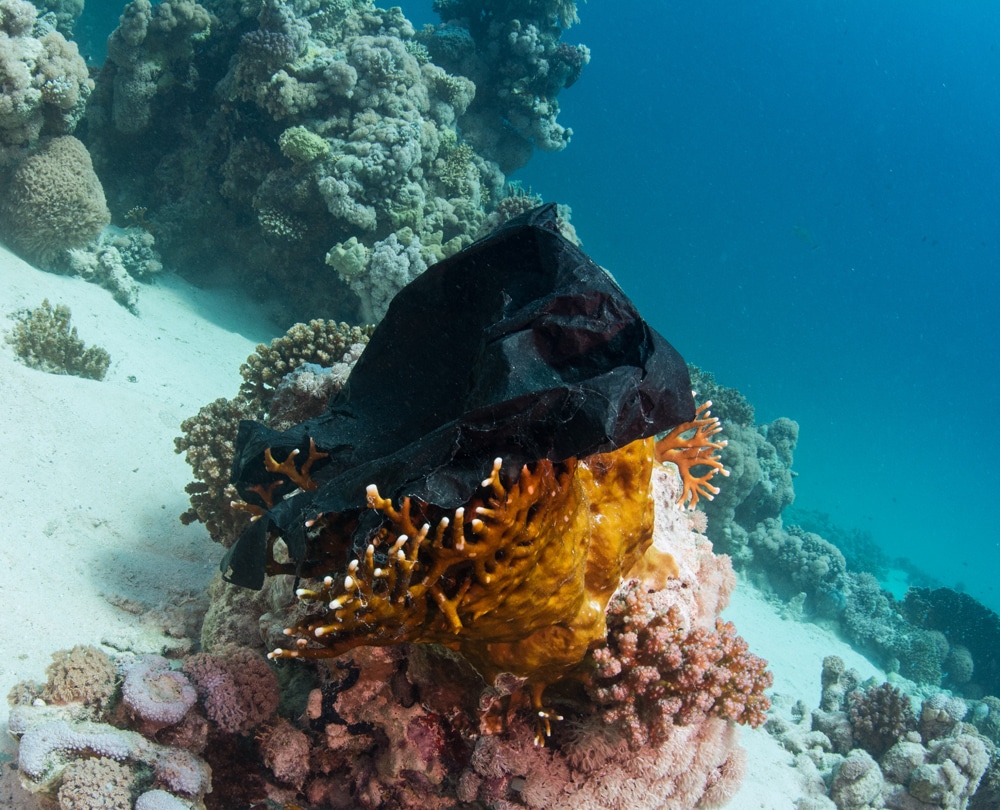Marine Life & Conservation Blogs
Is the Dive industry doing enough to tackle plastic pollution?

Plastic pollution has finally hit the news and whilst the task ahead is still huge, there are signs that the tide is changing for plastic polluting our seas and oceans. In the UK, there has been a “Blue Planet Effect” where one extremely popular TV series has had a profound influence on the way people think about the plastic they use. On top of this with Sky TV running a campaign on their sporting channels and the mainstream TV and paper news outlets finally bringing the problem into our sitting rooms, the public and politicians are taking note and starting to act.
What is the problem?
Well – all the plastic that has ever been made still exists. It might break down into smaller and smaller pieces, but it never goes away. Here are some more sobering facts:
- Over 8 million tonnes of plastic ends up in the ocean every year.
- The UN estimates that there are 51 trillion microplastic particles in the ocean – 500 times more than the number of stars in the galaxy. Plastic debris outweighs plankton by a ratio of 36 to 1. Oceans are predicted to contain more plastic than fish by 2050.
- More than 5 trillion plastic pieces weighing over 250,000 tonnes afloat at sea. In July 2017, a plastic waste patch bigger than Mexico was discovered floating in the Pacific Ocean.
- Plastic products leach toxins that are now found in most people. Exposure to these toxins is linked to infertility, cancers and many other health problems.
- In 2016, 6,000 Great British Beach Clean volunteers picked up 268,384 individual pieces of plastic from 364 British beaches over just one weekend.
Wild animals get entangled in plastic, eat it or mistake it for food and feed it to their young. Over 260 species have been reported to ingest or become entangled in plastic debris, resulting in impaired movement and feeding, reduced reproductive output and death. Plastic is ingested by 31 species of marine mammal and more than 100 species of sea birds.
So what are divers doing to help?
Lots – but there is so much more to do! Of course, divers are usually passionate about the oceans and marine life, so can be the best advocates for promoting the idea of giving up single-use plastic.
Our very own Nick and Caroline Robertson-Brown helped to set up a campaign called SeaStraw that is helping bars and restaurants give up single-use plastic and they are having great success in Manchester where they live. Businesses can download and sign their pledge from the website, putting themselves on the Ocean Heroes Map, by clicking here.
We recently ran a story about a liveaboard fleet that has given up plastic straws and aims to be single-use plastic free by 2019. You can read about that here: www.scubaverse.com/liveaboard-fleet-makes-plastic-pledge
Lots of dive centers, resorts and liveaboards we have recently dived with are giving away re-usable water bottles, rather than single-use plastic cups.
Many dive centres organise beach clean-ups to remove plastic pollution from the shoreline and even underwater.
Charities such as Project Aware and the Marine Conservation Society collect both rubbish and vital data about plastic pollution in our oceans.
But there is more that can be done, and it will take divers to speak up, celebrating the good as well as calling out bad practices to help us stamp out plastic pollution in our oceans. For example, email your favourite dive manufacturer and ask them to use less plastic in their product packaging. Refuse single-use plastics like straws and cups from the bars and restaurants you frequent on diving trips and in every day life. Don’t take part in balloon releases. Every little thing you do will help.
Contact Us
We want to know what you have encountered on your dive trips around the world. What great initiatives have you seen? Please give a shout out to the dive establishments that are doing their bit and give them the recognition they deserve. If you run a dive centre and are doing your bit – let us know.
Blogs
Saba’s Plan for a Coral Comeback

Saba has an exciting new initiative to restore its coral reefs. This new project, running from 2024 to 2026, will focus on reviving key species in the island’s underwater ecosystems. With a collaborative team from the Saba Conservation Foundation (SCF) and Van Hall Larenstein (VHL) University of Applied Sciences, the project aims to restore both corals as well as sea urchins.
This initiative is centered around coral restoration, specifically reviving two essential coral species—staghorn coral (Acropora cervicornis) and elkhorn coral (Acropora palmata). By mapping parent colonies and using a technique known as coral gardening, SCF will create and maintain coral nurseries. These corals will eventually be outplanted at key reef sites around Saba to not only expand the number of coral colonies, but also provide essential fish habitat. The project focusses on installing coral nurseries, training staff with the newest techniques and starting with the restoration of key reef sites.

Reef Cleaners to the Rescue
It’s not just corals getting a makeover—this project also shines a spotlight on the essential role of grazers, particularly sea urchins. VHL is leading the charge on cultivating and restocking two key sea urchin species, West Indian sea egg (Tripneustes) and long-spined sea urchin (Diadema), known for their ability to keep algae in check. By removing algae, which are important competitors of corals, they help the coral to thrive. By restoring these “reef cleaners,” Saba’s project will give corals the breathing room they need to grow, setting the stage for a healthier, more balanced marine ecosystem.
From Tiny Urchins to Big Goals
The project will be funded as part of the Dutch Government’s Nature and Environment Policy Plan (NEPP) 2020-2030 for the Caribbean Netherlands, a comprehensive initiative aimed at conserving and restoring the unique natural environments of the Dutch Caribbean islands, including Saba, St. Eustatius, and Bonaire. This project is aiming for big milestones: build and maintaining coral nurseries, the expansion of urchin cultivation facilities, and the creation of a dedicated research center. By 2026, the project hopes to ramp up coral and grazer restoration, with the ultimate goal of extending these efforts across the Dutch Caribbean. By linking local initiatives to broader regional goals, Saba’s restoration project promises to leave a lasting impact on both the environment and the community.
Find out more about the DCNA at dcnanature.org.
Blogs
Reef-World marks two decades of marine conservation: strengthening impact amid coral reef threats

Empowering ocean stakeholders to tackle future challenges and ensure the survival of coral reefs and humanity
2024 marks the 20th Anniversary of The Reef-World Foundation’s tireless efforts for global coral reef conservation. The UK charity is the international coordinator of the UN Environment Programme’s Green Fins initiative, known as the leading voice in sustainable marine tourism. Today, Reef-World released its 2023-2024 Impact Report outlining a year of substantive growth and impact in its marine conservation programmes.

Impact Report Highlights:
- Impressive improvements in environmental behaviours to protect coral reefs by the marine tourism industry as the global participation of Green Fins increases.
- Continued capacity building for government and NGO staff to effectively manage marine tourism activities in Asia, Caribbean and Red Sea regions.
- For the first time in Green Fins’ 20-year history, tourism operators have achieved ‘Best Environmental Performer’ status by demonstrating the lowest possible environmental impact in their environmental assessments. In 2024, three dive operators achieved this challenging milestone.
- Significant increases in global participation of Reef-World’s innovative digital conservation tools.
- 138 Green Fins dive operator members achieved the strict threshold for PADI Eco Center recognition.
- Developed four new educational materials and translated two into 16 languages to support the marine tourism industry in achieving sustainability targets.
- Establishing a new Reef-World Development strategy and recruiting new roles – Development and Programmes Managers.
- Reef-World’s board welcomes new Chair and Trustees strengthening organisational leadership.

Reef-World started as a one-person mission to inspire and empower communities to act in conserving and sustainably developing coral reefs and related ecosystems. Today, the team of 12 continues to meet this mission by inspiring and empowering the global marine tourism community to be exemplary sustainability leaders by using the Green Fins guidelines and tools to simultaneously use and protect the world’s precious reefs.
In April 2024, the fourth global coral reef bleaching event was confirmed. Reef-World’s work has never been more urgent as the marine environment, and the benefits they provide humanity, continue to be eroded by global threats. The reduction of local threats, like those from the marine tourism industry, is an essential step to ensuring a future where coral reefs survive and continue to support the millions of people who depend on their ecosystem benefits. Reef-World’s work buys time for coral reefs and related ecosystems to be resilient to the impacts of global threats.
“Right now our corals are facing the greatest fight of their existence as the terrifying predictions of the steps towards their complete extinction are starting to come true. But all is not lost, reefs are resilient and they have existed on this planet for millions of years. We must take action now, to buy time for reefs by reducing threats facing them and allowing them to react and adjust to the changing environment they need to survive in.” – Chloe Harvey, Executive Director
Looking Forwards:
Like coral reefs, the Reef-World team needs to be resilient in the face of the complex challenges of the conservation sector. Reef-World has invested significantly in developing a Culture of Care to ensure the well-being of its team on a daily basis, continuing to be an exemplary employer to enable its team to best achieve the mission for coral reef conservation.
With the foundations of a Culture of Care and organisational development laid, Reef-World is emerging from the end of a natural organisation life cycle, that brings the challenges of growth and scale, stronger than ever. With a new strategy in place to generate much needed resources, Reef-World is excited for the opportunities to leap forward, continue to scale our impact and lean into new innovations and untapped opportunities for marine conservation.
We continually strive to become a forward-thinking organisation that delivers on our goals and commitments to our stakeholders with fresh approaches and not being afraid of steering away from a “normal approach.” This approach is not only applied to our programmes of work but also internally and carries over to our Culture of Care for our team.” — JJ Harvey, Operations Director

The Reef-World Foundation is immensely grateful for the continued support of its grant funders: UN Environment Programme, IUCN’s Blue Natural Capital Financing Facility, Adventure Travel Conservation Fund, PADI Aware Foundation, and World Nomads Footprints Program.
Reef-World would also like to express its gratitude to international partners whose vital support has resulted in significant tangible benefits for our work and mission: PADI; Professional SCUBA Schools International (PSS); Explorer Ventures; 1% for the Planet; ZuBlu; Snorkel Venture, GSTC; Dive O’Clock; Seven Dragons; DiveAssure and Eco Beach, without whom these achievements would not be possible.
The full 2023–2024 Annual Impact Report is available on Reef-World’s website.
-

 News1 month ago
News1 month agoIconic SS United States to become the World’s Largest Artificial Reef
-

 Blogs3 months ago
Blogs3 months agoNovoScuba’s Game-Changing Approach for Dive Store Owners: WE PAY YOU!
-

 News2 months ago
News2 months agoBook Review – 52 Assignments: Underwater Photography
-

 Gear News2 months ago
Gear News2 months agoDYNAMICNORD – New German diving brand enters the British market
-

 News2 months ago
News2 months agoExploring Cenote El Pit: A Diver’s Dream
-

 Gear News2 months ago
Gear News2 months agoTry BARE drysuits (and maybe even win one!) this Friday with Sea & Sea at North West Dive Fest
-

 News3 months ago
News3 months agoComing Soon – 52 Assignments
-

 News3 months ago
News3 months agoSave £200 per person per week at Pole Pole Lodge with Dive Worldwide















